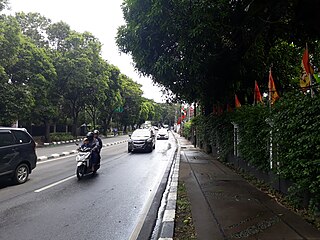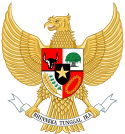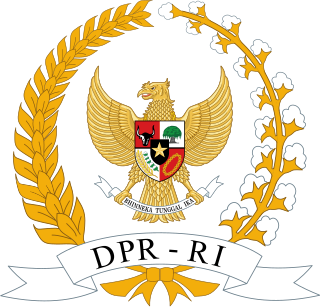
Abdurrahman Wahid, colloquially known as Gus Dur, was an Indonesian Muslim religious and political leader who served as the President of Indonesia from 1999 to 2001. The long-time president of the Nahdlatul Ulama and the founder of the National Awakening Party (PKB), Wahid was the first elected president of Indonesia after the resignation of Suharto in 1998.

The Indonesian Democratic Party of Struggle is an Indonesian political party, and the party of the current President of Indonesia, Joko Widodo.

The first direct presidential election in Indonesia was held in two rounds on July 5 and September 20, 2004. Prior to a 2002 amendment to the Constitution of Indonesia, the President and Vice President were elected by the country's top legislative body, the People's Consultative Assembly.

Susilo Bambang Yudhoyono, commonly referred to by his initials SBY, is an Indonesian politician and retired Army general officer who was the President of Indonesia from 2004 to 2014. He is currently the chairman of the Democratic Party of Indonesia and President of the Assembly and Chair of the Council of the Global Green Growth Institute. President Yudhoyono was also the former Chairman of ASEAN due to the hosting of Indonesia of the 18th and 19th ASEAN Summits.

Elections in Indonesia have taken place since 1955 to elect a legislature. At a national level, Indonesian people did not elect a head of state – the president – until 2004. Since then, the president is elected for a five-year term, as are the 560-member People's Representative Council and the 128-seat Regional Representative Council.
Suharto resigned as president of Indonesia on 21 May 1998 following the collapse of support for his three-decade long presidency. The resignation followed severe economic and political crises in the previous 6 to 12 months. B.J. Habibie continued at least a year of his remaining presidential years, followed by Abdurrahman Wahid in 1999.

Muhammad Jusuf Kalla is an Indonesian politician who has been Vice President of Indonesia since 2014, having previously served from 2004 to 2009. He was unsuccessful as Golkar's presidential candidate in the 2009 presidential election. Since 2009 Kalla has served as the Chairman of the Indonesian Red Cross Society. Before Kalla declared himself as the running mate for Joko Widodo in the 2014 presidential election, a 2012 poll placed his popularity among likely voters in the top three contenders for the presidency and ahead of his own party's nominee Aburizal Bakrie. He is the first person to hold two non-consecutive terms as Vice President of Indonesia.
The Post-Suharto era in Indonesia began with the fall of Suharto in 1998 during which Indonesia has been in a period of transition, an era known in Indonesia as Reformasi. A more open and liberal political-social environment ensued following the resignation of authoritarian President Suharto, ending the three decades of the New Order period.
The People's Democratic Party (PRD) is a democratic socialist party in Indonesia.

Presidential elections were held in Indonesia on 8 July 2009. The elections returned a president and vice president for the 2009–2014 period. Incumbent President Susilo Bambang Yudhoyono, elected with a 20% margin in the 2004 election, sought a second term against former President Megawati Sukarnoputri in a rematch of the 2004 election, as well as incumbent Vice President Jusuf Kalla. Securing a majority of the votes in a landslide victory in the first round, Yudhoyono was re-elected without the need to proceed to a second round, scheduled to be held on 8 September if no candidate received a majority of the popular vote. Yudhoyono was officially declared the victor of the election on 23 July 2009, by the General Election Commission. Yudhoyono, with nearly 74 million votes in his favor, holds the record for the highest number of votes for a single person in any democratic election in history.

Indonesia's fifth legislative election, and the fourth under the New Order government, was held on 23 April 1987. There were three participants; the two political parties and the "functional group" Golkar. Like all the New Order elections, it was an outright victory for Golkar.

Indonesia's sixth legislative election, and the fifth under the New Order regime, was held on 9 June 1992. Although the share of the vote won by Golkar declined, and the two parties saw their votes rise, the government organisation still won a clear majority.

The 1999 Indonesian legislative election, held on 7 June 1999, was the first election since the end of the New Order and the first free election in Indonesia since 1955. With the ending of restrictions on political activity following the fall of Suharto, a total of 48 parties contested the 462 seats up for election in the People's Representative Council. A further 38 seats were reserved for the armed forces.

Legislative elections were held in Indonesia on 9 April 2014 to elect 136 members of the Regional Representative Council (DPD), 560 members of the People's Representative Council (DPR) and members of regional assemblies at the provincial and regency/municipality level. For eligible voters residing outside Indonesia, elections were held on 5 or 6 April 2014 based on the decision of electoral commission of each different countries.

The 27 July Incident was an attack by Indonesian government forces on the head office of the Indonesian Democratic Party, which was being occupied by supporters of recently ousted party leader Megawati Sukarnoputri. It was followed by two days of riots in Jakarta.
















